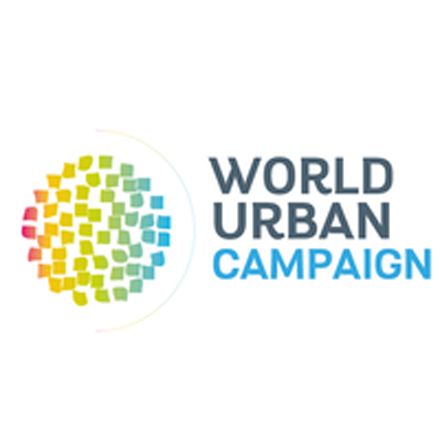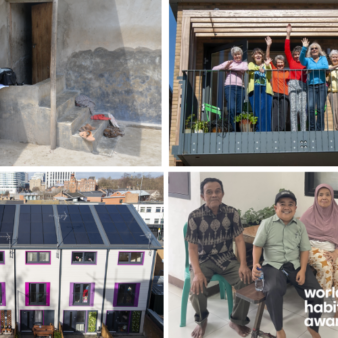
A lot has changed since the outbreak of COVID-19. But at World Habitat our vision remains the same – a world where everyone has a safe and secure home as part of a successful community. For this to be achieved, the global response to the pandemic has needed to urgently address street homelessness – both in the short and long-term.
Recently, World Habitat brought together experts from across the world to discuss their local responses to COVID-19 – as part of UN-Habitat’s Urban Thinkers Campus.
Here are our top five takeaways from the discussion.
1. Integrated health care is essential
Everyone agreed that homelessness is a public health crisis.
As practitioners, we already knew this, but COVID-19 has made it clearer than ever before that integrated health care is essential to offering homeless people the support that they need. Reflecting on the response in Edmonton, Canada, Susan McGee, from Homeward Trust, explained:
“Everybody has a role and as a health response we’ve really […] needed to emphasise the responsibility of our health system throughout our planning efforts.”
An effective integrated approach will include individualised care plans with input from health staff, mental health and addiction services, housing departments, social services, government, and community and charity sector partners. Michelle Major, from Homeless Network Scotland in Glasgow, told us:
“Health and Social Care integration being so important has really proven to be the case in Glasgow. We’ve seen high levels of collaboration and homelessness has been treated with the urgency that it always should be.”
2. We need robust data if we are going to deliver the right solutions
Research and data will help us respond to both the current crisis and future emergencies. Julia Wagner, from the Institute of Global Homelessness, suggested that organisations should:
“Collect disaggregated data where possible to understand the needs and vulnerabilities of rough sleepers, have accurate data of who exactly is homeless and prioritise responses based on need.”
Robust data enables frontline services to anticipate changes in housing need. Susan McGee talked about their approach to data in Edmonton:
“[We are trying to] communicate on an investment perspective how much more expensive it is to do outreach with very large encampment populations, compared to housing them. There’s lots of analysis going on. […] We’re just talking about scenarios and modelling and trying to create a broad understanding of the potential consequences of the decisions that we may make.”
3. Collaboration and partnerships are crucial
Across the world, COVID-19 has forced different sectors – local and national government, public health institutions and NGOs – to come together to provide protection for people who are homeless.
In South Africa, for example, there are no national or provincial government policies dedicated to tackling homelessness, resulting in an extremely challenging starting point when the pandemic took hold. Nevertheless, Wayne Renkin, from Tshwane Leadership Foundation, explained the extraordinary partnership work that has taken place:
“Over the last few months, we have seen unprecedented collaboration and partnership do amazing things. In the city of Tshwane, we lobbied and were able to set up an official COVID Homeless Response Task Team […]. We collaborated with churches, NGOs, resident and neighbourhood associations, and academic institutions. Overall, we had over 24 organisations and institutions that collaborated just in our own city. We opened 25 shelters in just a few weeks and 1,500 – 2,000 people were able to get into shelters.”
Not only have collaborations been crucial to the immediate emergency response, but they are also imperative to ensuring that long-term sustainable changes happen. Michelle Major told us about the experience in Scotland:
“The Everyone Home Collective is made up of 23 NGOs in Scotland […] that have come together with the aim of creating a shared framework for recovery from the crisis, and how we can lobby the government to ensure that all the good changes that have come around because of the pandemic are kept going forward and that we don’t just revert back to what was normal before.”
4. We cannot succeed without action and funding from governments
The responses of some governments have demonstrated that – with the right funding and political will – ending street homelessness is possible. Patrick Duce, from World Habitat, said:
“Where people who are street homeless have been brought in off the streets, lives have been saved. But we must make sure that we don’t regress to pre-pandemic conditions.”
Julia Wagner provided some examples:
“In the UK, the government has committed over 100 million [pounds]. In Sydney, the government of New South Wales has dedicated 36 million [dollars]. In Chicago, they’ve set aside money for […] permanent housing for [over 1,000] homeless people. It’s been great to see the political response to reduce and ultimately end homelessness in these cities.”
Whilst these emergency responses are both necessary and welcome, it is imperative that they are followed up with long-term commitment to ending homelessness. Pierre Ryckmans, from Infirmiers de Rue in Brussels, explained:
“We have seen that when needed, the means are found, and we have solutions. When we have the means and the solutions, we co-ordinate and it allows everybody to work together and it works really well, but you need to have the means to do that. We are still lobbying politicians to have the system of temporary hotel accommodation prolonged further until at least March next year […] so that everybody will stay inside over winter.”
5. We must understand the experiences of people who are street homeless
Without centring people with lived experience of homelessness in the design of systems and solutions, we cannot solve homelessness. Our panel shared that throughout the pandemic, the homeless people they work with have displayed a huge amount of self-discipline, autonomy and independence in making sure that they kept themselves and others safe.
We also need to go further than just gathering robust data and challenge our own misconceptions to ensure that homelessness is viewed as an avoidable and intolerable outcome of a dysfunctional system. This brings us back to the first point – homelessness is a public health crisis, not because of the pandemic, but in spite of it.
Wayne Renkin concluded:
“The pandemic has highlighted that homelessness is an extreme expression of poverty, injustice, and inequality. It has placed an emphasis on homelessness as a crisis. Meaning that homelessness has not become a crisis because of the pandemic but that homelessness itself is a crisis […]. The time for action is now!”
To get regular updates on our European End Street Homelessness Campaign – subscribe to our newsletter here.




Join the discussion